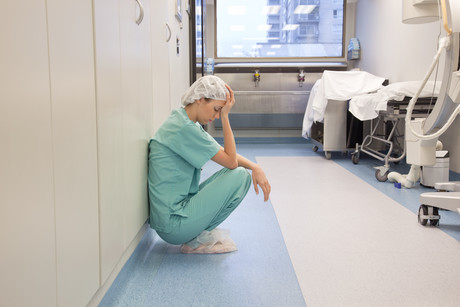Study: 40% of healthcare professionals work while sick
Thursday, 09 November, 2017

Healthcare professionals (HCPs) should heed their own advice: stay home when sick.
A new study has found that HCPs are among the most likely to go to work when sick. Some four in 10 HCPs work while experiencing influenza-like illness (ILI), according to findings published in the November issue of the (AJIC), the journal of the (APIC). As in all workplaces, contagious employees risk infecting others when they turn up for work. But with higher concentrations of older patients and individuals with immunosuppression or severe chronic diseases in healthcare facilities, ILI transmission by HCPs presents a grave public health hazard.
“The statistics are alarming. At least one earlier study has shown that patients who are exposed to a healthcare worker who is sick are five times more likely to get a healthcare-associated infection,” said lead researcher Dr Sophia Chiu, . “We recommend all healthcare facilities take steps to support and encourage their staff to not work while they are sick.”
The annual study, conducted via a national online survey, collected data from from 1914 HCPs during the 2014–2015 influenza season. Respondents self-reported ILI, defined as the combination of a fever and cough or sore throat, and listed factors that prompted them to turn up for work.
The survey assessed a variety of health occupations across multiple institutions: physicians; nurse practitioners and physician assistants; nurses; pharmacists; assistants/aides; other clinical HCP; non-clinical HCPs; and students. Four types of work settings were assessed: hospitals; ambulatory care or physician offices; long-term care facilities; or other clinical settings.
Among the findings:
- Of the 1914 HCPs surveyed, 414 reported ILI. Of these, 183 — or 41.4% — reported working for a median duration of three days while experiencing influenza-like symptoms.
- ���ϳԹ�Ⱥ��-based HCPs had the highest frequency of working with ILI (49.3%), compared to HCPs at long-term care facilities (28.5%). Clinical professional HCPs were the most likely to work with ILI (44.3%), with pharmacists (67.2%) and physicians (63.2%) among those with the highest frequency.
- In contrast, the survey found that assistants and aides (40.8%), non-clinical HCPs (40.4%), nurse practitioners/physician assistants (37.9%) and other clinical HCPs (32.1%) worked while sick.
The most common reasons for HCPs to opt from taking sick leave included feeling that s/he could still preform her/his job duties; not feeling “bad enough” to stay home; feeling as if s/he were not contagious; sensing a professional obligation to be present for coworkers; and difficulty finding a coworker to cover for her/him. Among the HCPs who felt they could still preform their job duties, 39% sought medical attention for their ILI symptoms, as did 54% of those who did not think they were contagious. 49.8% of HCPs in long-term care settings who reported for work when sick reported doing so because they couldn’t afford to lose the pay.
Previously published results from this survey described that only 77.3% of respondents reported receiving a flu shot.
The recommends that anyone with ILI wait 24 hours after a fever breaks before returning to work.
$12m for homegrown heart disease and diabetes innovations
$12 million in federal funding has been announced for the development of new Australian-made...
National cancer screening program marks first in almost 20 years
From 1 July, the National Lung Cancer Screening Program will commence — marking the first...
Doctor deregistered after botched facelift calls for ambulance
A Queensland doctor has been deregistered after a botched cosmetic surgery procedure left a...





